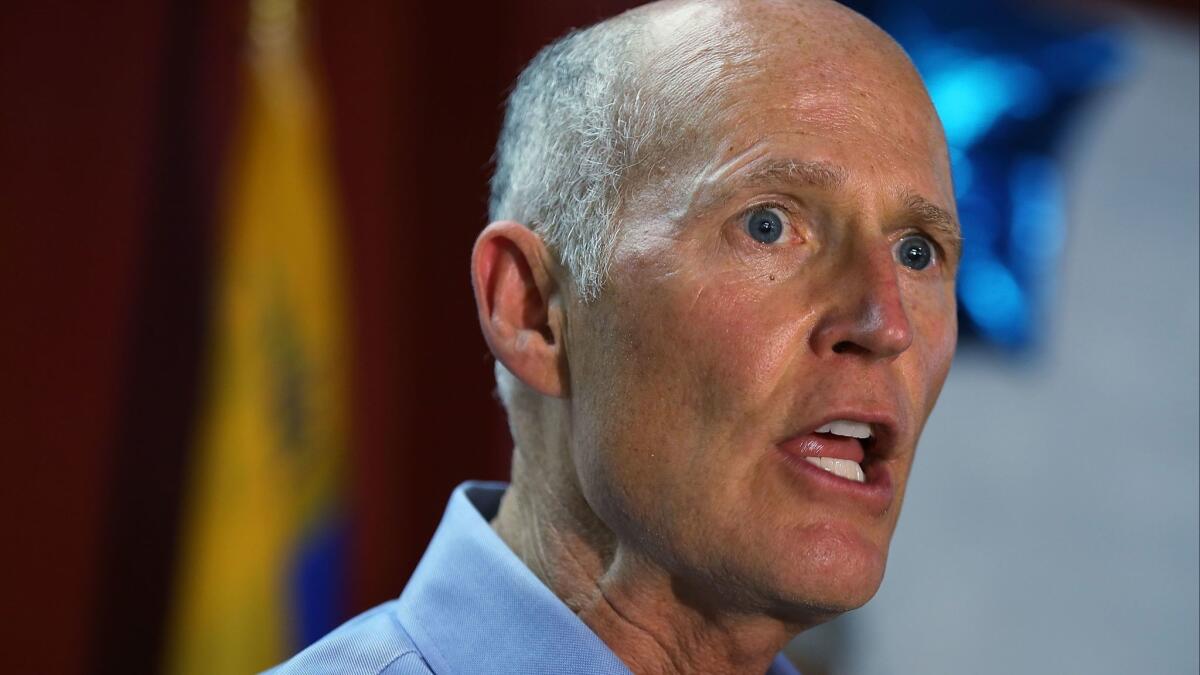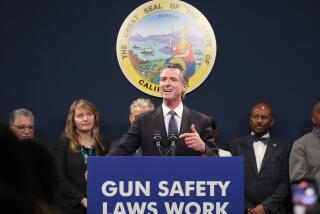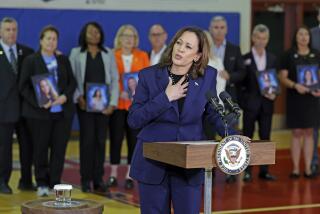Florida governor breaks with NRA, backs tighter gun restrictions

As teachers returned Friday to the Florida high school where a shooter killed 17 students and instructors, the state’s governor announced sweeping plans to tighten gun laws and bar anyone younger than 21 from purchasing a firearm.
The proposal marked a dramatic break with the National Rifle Assn. and comes after emotional appeals from students at Marjory Stoneman Douglas High School in Parkland.
Scott, a Republican and an NRA member, said his $500-million plan would raise the state’s minimum age to buy firearms, bar “violent or mentally ill” people from purchasing weapons and prohibit the purchase or sale of bump stocks.
“We all have a difficult task in front of us … balancing our individual rights with our obvious need for public safety,” he said.
“But I will not accept the old, tired political notion that we don’t have enough time to get anything done. … Let me be clear — there is nothing more important than the safety of our children.”
While Scott backed raising the minimum age to buy any firearm to 21 — a limit that already applies to handguns — he drew the line at introducing an all-out ban on assault weapons, such as the AR-15-style rifle used in last week’s school attack.
“Banning specific weapons and punishing law-abiding citizens is not going to fix this,” Scott said.
The NRA has long opposed any changes to the minimum age to buy a firearm. Yet Scott, who began his speech listing the names of those who died in the school massacre, said he had spent the last week listening to students who urged lawmakers in Tallahassee to push for stricter gun control.
“My message to them has been very simple: You are not alone,” he said. “Change is coming … and it will come fast. This is a time when I believe we must all come together, and even cross party lines.”
Some Stoneman Douglas students who have been vocal advocates for stricter gun control suggested that Scott, who is currently mulling a U.S. Senate bid, is politically motivated.
“It’s just a ploy to get reelected for Senate,” said David Hogg, a 17-year-old student who survived the school shooting and has spoken out in the last week for tighter gun laws. “I absolutely respect him and I love that he’s taking actions on this, but his motivations are not in the right place.”
As teachers returned to Stoneman Douglas on Friday for the first time since the attack, some voiced skepticism about whether legislators in Florida’s Republican-controlled House and Senate would actually introduce sweeping change on gun control.
“I will believe it when it happens,” said James Gard, a math teacher who locked himself and several students inside his classroom during the rampage. “Let’s see if it’s more rhetoric. It sounds great, but they have promised so much before and then it didn’t pass through. How hard will they really try?”
After the 2016 shooting at the Pulse nightclub in Orlando, Democratic lawmakers made several unsuccessful attempts to ban assault weapons. Yet with a new groundswell of public outrage, there is a chance lawmakers could pass new gun restrictions before they wrap up their legislative session March 9.
On Friday, Republican leaders of the Florida Senate and House gathered at the Tallahassee statehouse to announce they would file companion bills to increase the minimum age for purchasing firearms to 21 and ban bump stocks. They also proposed imposing a three-day waiting period for all gun purchases in the state.
Scott’s plan calls for a new program, the Violent Threat Restraining Order, which would allow a court to ban a violent or mentally ill person from purchasing or possessing a firearm if a family member, community expert or law enforcement officer presented evidence of a threat of violence.
It also would prohibit a person from possessing or purchasing a firearm if they are the subject of an injunction for protection against stalking or sexual or domestic violence.
“I want to make it virtually impossible for anyone who has mental issues to use a gun,” Scott said.
Scott also proposed a sweeping range of new school security measures, providing funds to install metal detectors, bulletproof glass, steel doors and upgraded locks, and assigning a law enforcement officer in every public school.
He also planned to funnel $50 million into mental health initiatives, such as counseling and crisis management, for students and young adults who show signs of mental illness.
The governor’s announcement came a day after President Trump suggested that arming teachers would make schools “a much harder target.”
“A teacher would’ve shot the hell out of him,” Trump said of the accused shooter, Nikolas Cruz, a 19-year-old former student at Stoneman Douglas.
Scott said teachers should not be expected to wield guns.
“My focus is on bringing in law enforcement,” he told reporters. “I think you need to have individuals who are trained, well-trained.”
UPDATES:
12:30 p.m.: This article was updated with additional details.
12:10 p.m.: This article was updated with additional details about Scott’s plan.
This article was originally published at 10:25 a.m.
More to Read
Sign up for Essential California
The most important California stories and recommendations in your inbox every morning.
You may occasionally receive promotional content from the Los Angeles Times.











